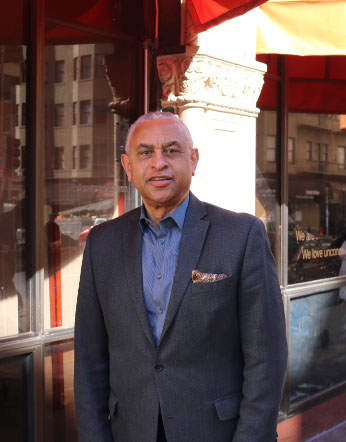GLIDE Voices is honoring Black History Month; we asked Erby Foster, Chief Financial and Operating Officer, what does Black History Month mean for you?

“Black History Month is an opportunity to learn and share. We want to celebrate differences and bring people along the journey. To me, it should be a way to use what happened in the past to inform the future. I like to say that the past is a place of reference, not a place of residence. We want to be able to see what happened and elevate it, so people have a better appreciation for what they don’t know. I’m a great, great, great grandson of an ex-slave. I am proud that my family has persevered and overcome a lot of challenges that we had, but I don’t let the past paralyze me. I try in a very intentional way to overcome it.
In 1921 John W. Cromwell Jr. was the first Black CPA in the United States. He had an undergrad and a master’s degree from Cornell. But he was not allowed to take the CPA exam, because of discrimination, because he’s Black. He couldn’t take it from DC, Virginia, or Maryland, where he lived. He had to go all the way up to New Hampshire and take the exam, and that’s how he passed. That’s how he became a CPA. Then, it took 45 years before there were 100 Black CPAs in the entire United States.
A hundred years later, there’s only 5,000 Black CPAs in the nation, out of 500,000 total CPAs. There’s more Black attorneys, doctors, and lawyers than there are CPAs. And I say, ‘Why is that?’ They had the education, they passed the exams. It was the work experience requirement. If you were Black, particularly in the ‘60s and ‘70s, the big firms wouldn’t touch you. They wouldn’t hire Black people, because the clients didn’t want a Black person looking at their financial books.
There’s something called ‘Black Tax’ and what I mean by that is, as a Black person, I had to work harder than my white counterparts to get the same recognition. If people are coming in at 9:00, I’m coming in at 8:00. If they’re leaving at 5:00, I’m staying until 6:00. I’m doing 20% more work for the same money as people who work less, because of their privilege just by the nature of their background and their skin color.
It’s systemic racism. It’s an unknown story. When people think of racism, they think of other things, but in the profession like accounting, there was racism, and the big accounting firms wouldn’t hire Black people. That’s why the numbers are so small.
In a sense, I was a trailblazer. It made me become an advocate to help the next generation. I feel I’m here to create a path for the people that follow me. I got hired by one of the major accounting firms, Arthur Andersen. I got promoted to manager level, which was an even more rare thing. I was the first Black audit manager in the Western United States at Arthur Andersen. I became a role model that other people could see someone like them in a major firm and advancing. It encouraged me to help the next generation.”
Erby Foster, Chief Financial and Operating Officer
